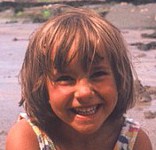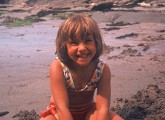Sarah's story. Her mother has hopes of David and Samantha Cameron
 Sarah was not born in 2002* but her mother wanted her story to be heard. Sarah died in 1981 when she was 10, at the same age as Ivan Cameron. As a bereaved parent Sarah's mother has hopes of David and Samantha Cameron.
Sarah was not born in 2002* but her mother wanted her story to be heard. Sarah died in 1981 when she was 10, at the same age as Ivan Cameron. As a bereaved parent Sarah's mother has hopes of David and Samantha Cameron.
*Peter Limbrick is collecting stories of children born in the same year as Ivan Cameron, the UK prime minister's son. Click here to learn more. If you can, please help spread our appeal for stories.
This is Sarah's story:
Like David and Samantha Cameron, I had a child who died aged ten. My heart went out to them when I heard that they had lost their son, Ivan. Perhaps, like me, and other parents who have experienced such an unspeakable loss, they will be caught unawares sometimes. A tune, a place, a fleeting thought about what made their child happy (or sad), a taste they hated, a photograph, can trigger an almost physical rush of emotion – overwhelming grief, tempered by the joy of having such a dearly loved child even for too short a time, and a mixture of anger and despair that such a loss is possible.
By the age of ten, a child has survived the fragility and potential for being cut short pre-birth, the buffeting and drama of being born. In our family, hazards like measles, or learning to cross the road, had been successfully faced and negotiated. We had ten years of loving, communicating with, and enjoying the company of a bright, conscientious, kind and funny little girl, getting to know her personality, the hopes and aspirations she had for herself as well as those we had for her.

When she was nine, something happened to Sarah. Nothing you could immediately put a finger on. She was tired and listless, and asked to go to bed as soon as she came home from school. Raised glands and pains in her neck prompted visits to the GP – several visits in fact – but he was dismissive and a bit irritated. He put it down to 'growing pains' and a fussy mother. It was only with persistence and finding a specialist ourselves that Sarah was eventually diagnosed with a rare form of bone cancer.
She died a year later. By then we had experienced the problems of trying to access treatment at a hospital miles away from where we lived, and the difficulties of transporting a quadriplegic child who could not sit in a car. Sarah was the middle one of my three daughters. Her sisters needed to be at school, go to Brownies, or have Mum or Dad help them with their reading instead of being 90 miles away waiting for the result of yet another biopsy. Family life was fragmented, and there was no-one to plug the gaps. The services that were available didn't match what we needed most.
Sarah was in and out of hospital, frequently and unpredictably at first, and then regularly for radiotherapy and chemotherapy. Kate and Anna often came home from school to an empty house and yet another note saying "Had to go back to hospital, please go to Jenny's (or Eunice's, or Nicky's) for tea. She knows you're coming." When Sarah came home from hospital, as parents we had too little sleep because one of us had to sleep in Sarah's room where we could use the suction machine when she had breathing difficulties. We didn't have a Social Worker, or night sitters, and the special refuse collection for incontinence pads and other medical waste took so long to set up that the van came for the first time on the day after the funeral.
Fast-forward 31 years. Sarah died in 1981. For the rest of the family life goes on, changed and challenged by the experience and the knowledge that nothing will ever be the same again. For the last ten years of my working life I worked in children's hospices, and as Director of Support Services in a charity that helps families affected by a disabling degenerative genetic condition. This is the reason I am writing this account. My personal experience as the mother of a ten year old who became severely ill, disabled, and died, was over thirty years ago. But I know from my professional experience that so many of the problems we faced as a family all those years ago are still problems for families now. I keep hearing my own story repeated with little variation.
One of the key issues is the need for GPs and other health professionals to listen to what parents tell them. Almost all the accounts I have heard about other families' experiences show how distressing it is for parents to feel that their anxieties are being dismissed. Parents may not be able to identify what is wrong, but they are usually the best people to recognise and describe change.
The physical and emotional drain on parents caring for a child who is chronically sick or disabled impacts upon the whole family. Lack of sleep, the physical demands of care tasks as children get bigger and heavier, and the consequences of stress and anxiety on all members of the family group, have potentially long term effects. Joined-up, needs-led services might help to mitigate the damage.
The impact having a child chronically sick or disabled child has on family finances is significant. This is a common experience, and well documented. Changes in legislation, for example with regard to benefits, and constant cuts in services, are making things worse, not better, for many families.
I hope that when David and Samantha Cameron are in my situation, thirty years on, they will have grown -up children who have coped with and adapted to the loss of their sibling; that the love and joy they experienced in the short time they had with Ivan will outweigh the grief they feel about losing him (even though the balance seems precarious sometimes). I also hope that, in common with many parents of chronically sick or disabled children, or whose children have died, they will do their utmost to try to improve the lives of parents and families who are going through similar experiences now. The opportunity to help make life less difficult for others is one of the few good things that can come out of a generally sad and negative experience for parents who lose a child.
 If you want to contact Sarah's mother please e-mail This email address is being protected from spambots. You need JavaScript enabled to view it.
If you want to contact Sarah's mother please e-mail This email address is being protected from spambots. You need JavaScript enabled to view it.


